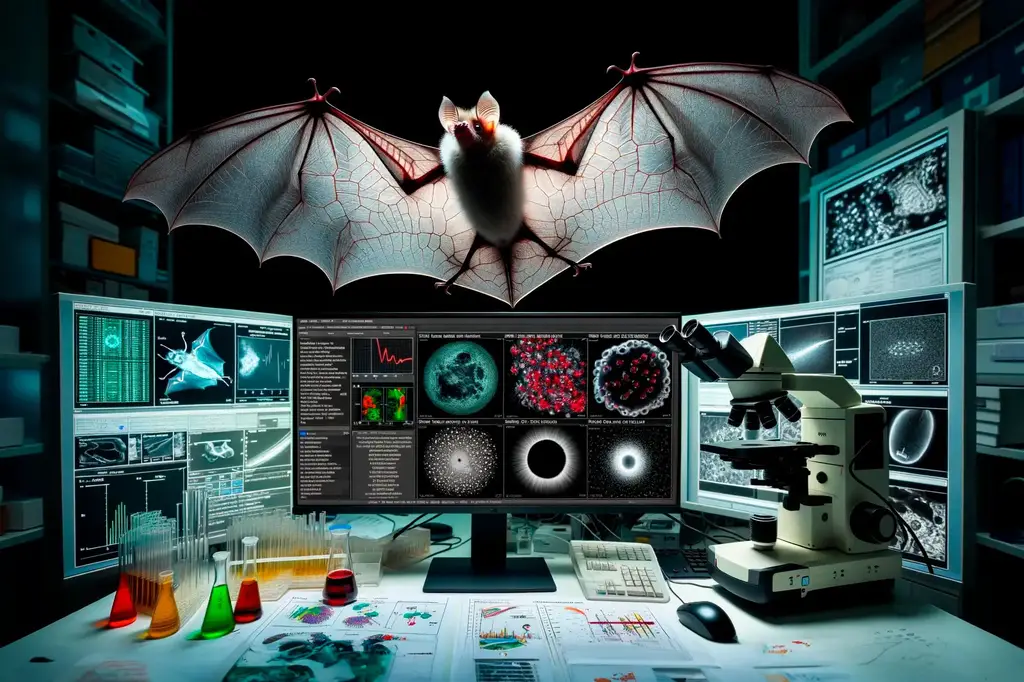What is the interest of genetic scientists in bats and parasites?
There is one very interesting combination of bats and vampire stories. Bat's tissues renew very fast. And that thing leads to the idea that maybe it's possible to combine bats' immune genomes and genomes that control the renewal of tissue with human genomes. Bats have no cancer, and that makes them interesting. How fast can renewing tissues avoid cancer? The reason why human neurons are not renewing very often is that by denying the renewing neurons, those cells avoid cancer.
Bats are animals that have the fastest-renewing tissues. The skin of their wings can renew very quickly. And that thing makes bats interesting. Their wing tissue's behavior is against the normal genetic model, where fast-renewing cells are the most vulnerable to cancer.
There is no cancer in a bat's tissue, and that thing makes those little flying mammals very interesting. Bats are also immune against many viruses. And that makes them interesting from the point of view of genetic engineering. By studying the bats' genetics and immune systems, researchers hope that they can find out how those abilities can transfer to the use of medical research.
"Bats, the only flying mammals, have an incredibly robust immune system that protects them from viruses harmful to humans and keeps them relatively cancer-free. Scientists from the Cold Spring Harbor Laboratory have found that the answer to this immunity lies in the bats’ genes. Through genomic sequencing, they discovered that bats have undergone rapid evolution, enabling them to defend against infections and cancer more effectively than other mammals." (ScitechDaily.com/Bats to the Rescue: Unraveling Immunity Secrets Against Viruses and Cancer)
"Researchers discovered that horsehair worms manipulate their insect hosts using genes acquired from the hosts themselves, shedding light on the role of horizontal gene transfer in evolution." (ScitechDaily.com/Genetic Thieves: New Research Reveals How Parasites Hijack Host Behavior With Stolen DNA)
Parasites can reprogram their cells to cheat the immune system.
Normally, reprogramming the cell happens by infecting it with RNA. The RNA molecule can be split into cells through ion pumps. Or some genetically engineered bacteria can input the wanted genome into the ion pumps of the cells.
There are many ways to do that. The RNA must destroy the existing DNA and then replace the genomes in the cells with new, fixed DNA. The RNA programs cell factories to make the new DNA. The problem with this technology is that there is a possibility that if the RNA retrovirus used in the reprogramming process escapes, that thing can transform all other cells into single-cell groups like liver cells.
The parasites can steal the DNA from their host. And that thing makes it possible that those things can cheat our immune defense. Because parasites can modify their cell's shell antigens, that has an effect that the immune system cannot recognize and fight against. This ability makes it possible to create artificial cells that will not activate the immune system.
https://scitechdaily.com/bats-to-the-rescue-unraveling-immunity-secrets-against-viruses-and-cancer/
https://scitechdaily.com/genetic-thieves-new-research-reveals-how-parasites-hijack-host-behavior-with-stolen-dna/




No comments:
Post a Comment
Note: Only a member of this blog may post a comment.